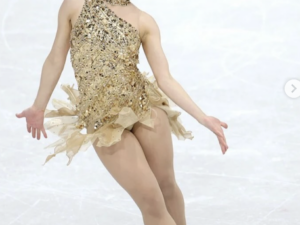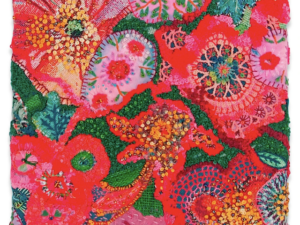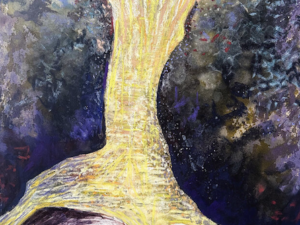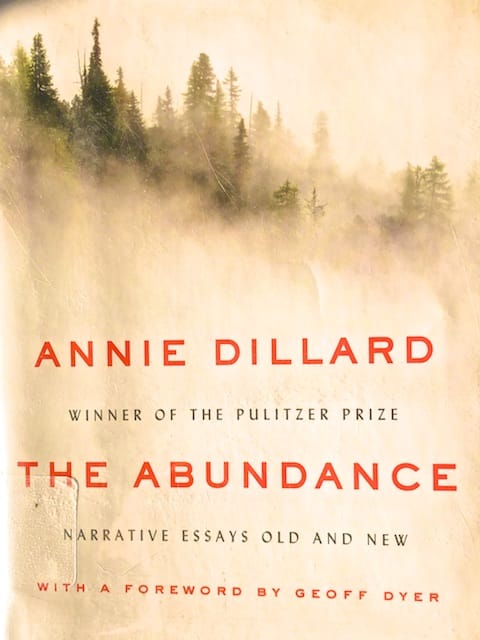
–
Reading The Abundance is like puttering around in someone’s mind, seeing as she sees, wondering as she does, watching her think things through. It is slow and contemplative, detailed and sweeping. She is bright and plucky, and as her reader, I like her, even though I don’t always agree with her. She focuses on death more than I want to, and is cynical in different places than I am. But reading her prose is like reading poetry; I often think like that too, so I felt right at home.
This book it made up of fragments of larger works of hers, and it was perfect for people like me who always think I’m going to read one of those, but never get to it. This book is compiled of snatches, which makes this slow, rich, slim, but ponderous book, the perfect bedtime reading.
With her, you’ll visit an eclipse of the sun, the death of a frog, a fascination with her mother’s skin, a chase by an indignant driver whose windshield she had thrown a snowball at, a summary of Teilhard de Chardin (who I didn’t realize was also a paleontologist), Chinese at Disneyland, and many other detours. On the way, you’ll get good advise on both writing and observing.
Here are some bits to whet your appetite:
- “One turns at last even from glory with a sigh of relief. From the depths of mystery, and even from the heights of splendor, we bounce back and hurry for the latitudes of home.”
- “Like any child, slid into myself, perfectly fitted, as the diver meets her reflection in a pool. Her fingertips on the water, her wrists slide up her arms. The diver wraps herself in her reflection wholly, sealing it at the toes, and wears it as she climbs rising from the pool, and ever after.”
- “For as long as I could remember, I had been transparent to myself, unself-conscious, learning, doing, most of everyday. Now I was in my own way; I myself was a dark object I could not ignore. I couldn’t remember how to forget myself. I didn’t want to think about myself, to reckon myself in, to deal with myself every livelong minute on top of everything else– but swerve as I might, I couldn’t avoid it. I was a boulder blocking my own path. I was a dog barking between my own ears, a barking dog who wouldn’t hush. So this was adolescence.”
- “Why do you never find anything written about that idiosyncratic thought you advert to, about your fascination with something no one else understands? Because it is up to you. There is something you find interesting, for a reason hard to explain because you have never read it on any page; there you begin. You were made and set here to give voice to this, your own astonishment. ‘The most demanding part of living a lifetime as an artist is the strict discipline of forcing oneself to work steadfastly along the nerve of one’s own most intimate sensitivity.’ (quote by Anne Truit).”
- “Write as if you were dying. At the same time, assume you write for an audience consisting of solely terminal patients. That is, after all, the case. What would you begin writing if you knew you were to die soon? What would you say to a dying person that would not enrage by its triviality?”
- “The art must enter the body too. A painter cannot use paint like glue or screws to fasten down the world. The tubes of paint are like fingers; they work only if, inside the painter, the neural pathways are wide and clear to the brain. Cell by cell, molecule by molecule, atom by atom, part if the brain changes physical shape to fit the paint. You adapt yourself, Paul Klee said, to contents of the paintbox. Adapting yourself to the paintbox, he said, is more important than nature and its study. The painter, in other words, does not fit the paints to the world. He most certainly does not fit the world to himself. He fits himself to the paint. The self is the servant who bears the paintbox and its inherited contents. Klee call this insight, quite rightly, ‘an altogether revolutionary new discovery.'”
- Writing every book the writer must solve two problems: Can it be done? and, Can I do it? Every book has an intrinsic impossibility that its writer discovers as soon as his first excitement fades… He writes in spite of that…he cantilevers the whole narrative out into thin air, and it holds.”
- “Why are we reading, if not in hope of beauty laid bare, life heightened, and its deepest mystery probed?”
- “One of the few things I know about writing is this: Spend it all, shoot it, play it, lose it, all, right away, every time. Don’t hoard what seems good for a later place in the book, or for another book; give it, give it all, give it now. The very impulse to save something good for a better place is the signal to spend it now. Something more will arise for later, something better. These things fill from behind, from beneath, like well water. Similarly, the impulse to keep to yourself what you have learned is not only shameful; it is destructive. Anything you do not give freely and abundantly becomes lost to you. You open your safe and find ashes.”
- “Chinese men lose no face by weeping.”
- “All I can do is try to gag the commentator, to hush the noise of useless interior babble that keeps me from seeing just as surely as a newspaper dangled before my eyes…. The world’s spiritual geniuses seem to discover universally that the mind’s a muddy river, this ceaseless flow of trivia and trash, cannot be damned, and that trying to damn it is a waste of effort that might lead to madness. Instead you must allow the muddy water to flow unheeded in the dim channels of your consciousness; you raise your sights; you look along it, mildly, acknowledging its presence without interest and gazing beyond it into the realm of the real where subjects and objects act and rest purely, without utterance. ‘Launch into the deep,’ says Jacques Ellul, ‘and you shall see.'”
- “The secret of seeing is, then, the pearl of great price. If I thought he could teach me to find it and keep it forever I would stagger barefoot across a hundred deserts after any lunatic at all. But while the pearl may be found, it may not be sought. The literature of illumination reveals this above all: Although it comes to those who wait for it, it is always, even to the most practiced and adept, a gift and a total surprise… I cannot cause light; the most I can do is try to put myself in the path of its beam. It is possible, in deep space, to sail on solar wind. Light, be it particle or wave, has force: You rig a giant sail and go. The secret of seeing is to sail solar wind. Hone and spread your spirit till you yourself are a sail, whetted, translucent, broadside to the merest puff.”
- “Teilhard’s friend Abbe Paul Grenet paraphrased his thinking about God: ‘His name is holy, but it is up to us to sanctify it; his reign is universal, bit it is up to us to make him reign; his will be done, but it is up to us to accomplish it.”
- “one of the few things we know about the Absolute is that it is relatively inaccessible.”
- “The days tremble with meanings. The corners heap up with poetry; whole unfilled systems litter the ice.”
Because of this book, I want to capture more detail, more regularly, in my journal. I want to read the hundreds of love letters published between Teilhard de Chardin (Jesuit priest) and Lucile Swan (divorced sculptor). I want to read Annie Dillard again too, but not too soon, letting all this sink in.
And while there were definitely moments where I was restless with pieces of this book, so many other parts glowed with insight and authenticity, I can’t help still giving it five stars.
This author is a natural treasure. She also feels like a childhood friend that I want to reconnect with for a long ramble in the woods, followed by a deep, but uproarious, conversation over tea.
–
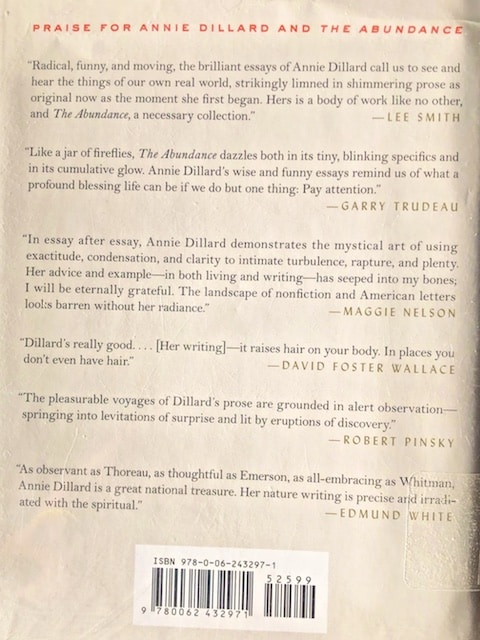
2 Comments
-
I think you’d like Pilgrim at Tinker Creek. Have you read that one yet?
-
Author
Not yet, but it is on my list.
-

